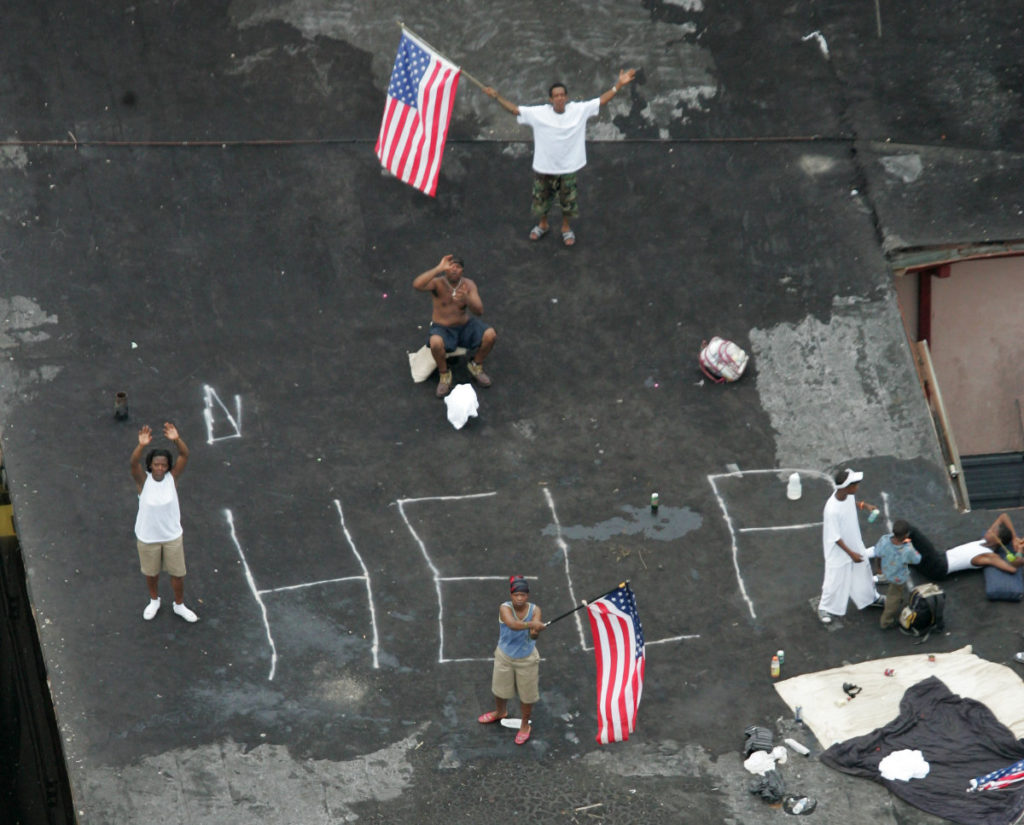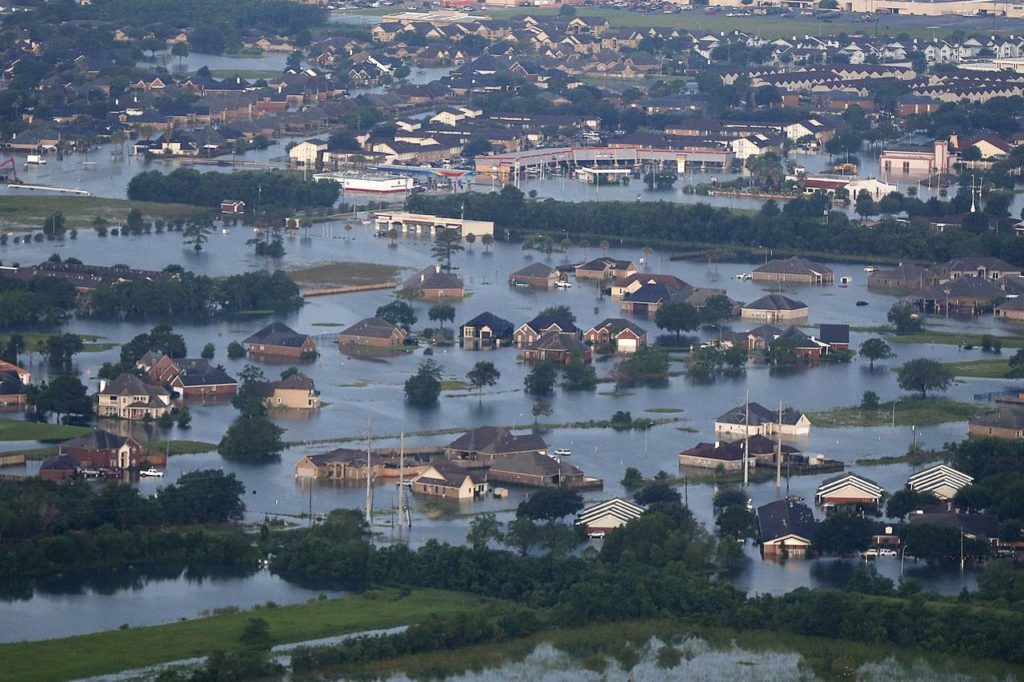 Hurricane Harvey has dominated news coverage the last few days (as I write), subsuming and flooding it just as it did Houston, reminding me of the scene in the second Christopher Reeve Superman movie when Kryptonian villain General Zod escapes the Phantom Zone and finds himself standing upon the surface of a lake. For a moment he seems to think he has emerged onto a planet covered entirely by water. He thinks it is “Planet Houston†(he says it “Who-stunâ€) because of a radio transmission he has overheard (or something). Now “Planet Houston†is indeed submerged beneath a watery surface, tragically, and its citizens are fleeing the flood like Kal-el from Krypton’s destruction. The amazing spectacle of volunteer rescue efforts lends the heavy doom cloud something of a silver lining: we needed a reminder that there is great good in the American people because the news is filled with the self-hatred of many whose patriotism has drowned in a deluge of survivor guilt.
Hurricane Harvey has dominated news coverage the last few days (as I write), subsuming and flooding it just as it did Houston, reminding me of the scene in the second Christopher Reeve Superman movie when Kryptonian villain General Zod escapes the Phantom Zone and finds himself standing upon the surface of a lake. For a moment he seems to think he has emerged onto a planet covered entirely by water. He thinks it is “Planet Houston†(he says it “Who-stunâ€) because of a radio transmission he has overheard (or something). Now “Planet Houston†is indeed submerged beneath a watery surface, tragically, and its citizens are fleeing the flood like Kal-el from Krypton’s destruction. The amazing spectacle of volunteer rescue efforts lends the heavy doom cloud something of a silver lining: we needed a reminder that there is great good in the American people because the news is filled with the self-hatred of many whose patriotism has drowned in a deluge of survivor guilt.
The other day I saw a Facebook post by an atheist pal of mine, observing that God appeared to be conspicuously absent from the rescue efforts. Can Christians possibly maintain their pretense that a loving God is in control of events? The Houston survivors owed their deliverance to their own and others’ heroic efforts, not to divine intervention. Of course, you can always say that God did intervene—through the actions of human beings. But that is weaseling. It is to demote God to a superfluous and redundant fifth-wheel pseudo-cause.
My friend concluded his comment with something like, “Does God care?†I could not resist adding my own quip: “God does care. It’s just that the results are the same as if he didn’t.†I hope readers caught on. My point is by no means a new one. Are you familiar with Antony Flew’s Parable of the Gardener? Here’s how it goes.
Once upon a time, two explorers came upon a clearing in the jungle. In the clearing were growing many flowers and many weeds. One explorer says, “Some gardener must tend this plot.” The other disagrees, “There is no gardener.” So they pitch their tents and set a watch. No gardener is ever seen. “But perhaps he is an invisible gardener.” So they set up a barbed-wire fence. They electrify it. They patrol it with bloodhounds. (For they remember how H. G. Wells’s The Invisible Man could be both smelt and touched though he could not be seen.) But no shrieks ever suggest that some intruder has received a shock. No movements of the wire ever betray an invisible climber. The bloodhounds never give cry. Yet still the Believer is not convinced. “But there is a gardener, invisible, intangible, insensible to electric shocks, a gardener who has no scent and makes no sound, a gardener who comes secretly to look after the garden which he loves.†At last, the Sceptic despairs, “But what remains of your original assertion? Just how does what you call an invisible, intangible, eternally elusive gardener differ from an imaginary gardener or even from no gardener at all?” (“Theology and Falsification,†1950)
In the same way, how does a God whose “caring,†whose compassionate supervision of his creatures, is compatible with letting them drown like rats, differ from a God who is utterly indifferent to their plight? The point is not so much that the assertion of God’s caring is false. No, it’s worse than that: it’s meaningless. You’re not even making an assertion anymore.
Look at it this way: suppose you and a friend are in Houston and Harvey is wreaking havoc outside. You’re both looking out the front window. You say, “Wow! Look at that storm!â€
Your friend replies, “Storm? What storm? I don’t see any storm out there!â€
You stare at your friend in stunned disbelief. “Of course there’s a storm out there! What the hell is the matter with you? The rain! The wind! The uprooted trees flying through the air! The mobile homes ricocheting like ping pong balls!â€
“Oh sure, I see all that stuff. But that doesn’t mean there’s a storm going on.â€
“Please tell me, my friend, how is that not a storm?â€
“It just isn’t, that’s all. Just because there are high winds, flooding, property damage, and people floating face down, that doesn’t mean it’s a storm.â€
“Look pal, I don’t think you even know what the word ‘storm’ means!â€
It occurs to you to open your dictionary to prove your point, but you notice that it’s floating away.
Or put the shoe on the other foot. The sky is clear, the sun shining. Children are romping outside without a care in the world. Neighbors are barbecuing. Your pal says, “Wow! That’s some damn storm out there, huh?â€
You do a double take. “Huh? What storm? What are you talking about?â€
Back and forth it goes, until your friend says, “I guess it’s just one of those storms that doesn’t get anybody wet and doesn’t damage any property! You know the kind I mean.â€
Uh, no, I don’t. If you can’t specify something, anything, that would show your claim to be false, you’re saying your assertion is compatible with any and every state of affairs. And if it means everything, then it means nothing!
And that’s exactly what you’re doing when you say Hurricane Harvey doesn’t debunk the existence of Divine Providence. You’re not making any sense. You’re not even wrong! You’re just speaking in tongues. It might make you feel better, but that’s only because you don’t know what you’re saying!
If you did, you’d wake up and realize there’s no one to blame, that no one caused this, and that the only assistance you can hope for is that of your fellow human beings. If there’s any compassion in this world, on Planet Houston, that’s where you’ll find it.
So says Zarathustra.




10 Responses to Planet Houston